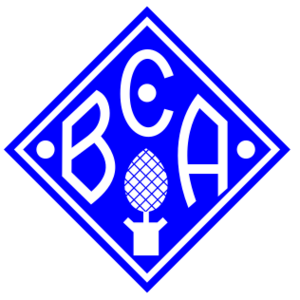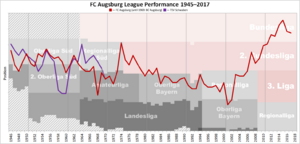FC Augsburg facts for kids
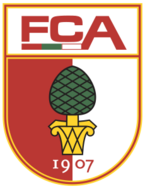 |
||||
| Full name | Fußball-Club Augsburg 1907 e. V. | |||
|---|---|---|---|---|
| Nickname(s) | Fuggerstädter (named after the famous Fugger family of Augsburg, founders of the Fuggerei) | |||
| Founded | 8 August 1907 | |||
| Ground | Augsburg Arena | |||
| Capacity | 30,660 | |||
| Owner |
|
|||
| Chairman | Markus Krapf | |||
| Head coach | Sandro Wagner | |||
| League | Bundesliga | |||
| 2020–21 | Bundesliga, 13th of 18 | |||
|
||||
FC Augsburg is a professional football club from Augsburg, Bavaria, Germany. Its full name is Fußball-Club Augsburg 1907 e. V. The team plays in the Bundesliga, which is the top football league in Germany.
The club started as Fußball-Klub Alemannia Augsburg in 1907. Later, it was known as BC Augsburg from 1921 to 1969. With over 27,000 members, FC Augsburg is the biggest football club in the Swabian region of Bavaria.
For most of its history, the club played in the second and third divisions. In the early 2000s, they even dropped to the fourth division for two seasons. However, the team made a great comeback. In 2011, they were promoted to the Bundesliga for the first time. They have stayed in the top league ever since.
In the 2014–15 season, FC Augsburg finished fifth, which was their best-ever result. This allowed them to play in the 2015–16 UEFA Europa League, a major European competition. They reached the Round of 32 but were knocked out by Liverpool.
Since 2009, FC Augsburg has played at the WWK ARENA. This stadium can hold 30,660 fans. It is located south of Augsburg city centre and is easy to reach by tram. The club is also known as the Fuggerstädter or simply FCA. They have strong support at home games. In the 2023–24 Bundesliga season, their average attendance was 29,301.
FC Augsburg has strong local rivalries with Ingolstadt and TSV 1860 Munich. Games against these teams often attract large crowds. A match in 1973 against 1860 Munich set a record for spectators at the Olympic Stadium. FCA also often sells out their local Bavarian derby matches against Bayern Munich.
The club's colours are red, green, and white. These colours are used on the team's kits. The club badge looks similar to the Augsburg city emblem. The team's training facilities are next to the stadium. There is also a club shop near Augsburg Hauptbahnhof in the city centre.
Contents
Club History
How FC Augsburg Started
In the late 1940s, people talked about combining Augsburg's two main clubs: TSV Schwaben and BC Augsburg. Both clubs had money problems. However, they were hesitant because they feared the other club would take over.
A serious meeting happened in 1964. By then, both clubs were no longer in the top football league. The leaders of Schwaben wanted the merger, but their football team did not. This stopped the plan for a while. BC Augsburg was seen as a working-class club from the north of Augsburg. Schwaben was for wealthier people from the south. The Wertach river often marked the boundary between their areas.
In 1968, both clubs were struggling. BC Augsburg was in the third division, and Schwaben was about to drop down too. Another attempt to merge was made. In April 1969, the leaders of both clubs met and decided to combine. The new club would be called FC Augsburg. It would focus only on football. The mayor of Augsburg, Hans Breuer, strongly supported this idea.
The merger happened when both teams were not doing well. Schwaben had just been relegated from the second-tier league. They felt they could not afford to get back up. BC Augsburg had just missed promotion to that league. In June, most members of BC Augsburg voted for the merger. Soon after, 75 percent of Schwaben's members also approved.
However, Schwaben decided to keep its other sports departments. Only its football team would join the new club. Some former members of Schwaben were not happy. They formed a new club, Eintracht Augsburg, and started from the lowest league. Because of this, FC Augsburg is usually seen as continuing the traditions of BC Augsburg, not TSV Schwaben. A year later, the Eintracht footballers rejoined Schwaben. But Schwaben's football team has remained an amateur club since then.
The new FC Augsburg played its first game on July 30, 1969. They played against 1. FC Nürnberg in Augsburg. About 13,000 fans watched them lose 0–3 in extra time.
Early Years and Challenges (1969–1983)
After forming in 1969, FC Augsburg mostly played in the second and third divisions. These included the Bayernliga, Regionalliga Süd, and 2. Bundesliga. The new team did not become an instant success. They finished fourth in the league, and fewer fans came to games. This showed that the new club was not yet fully accepted. The next season, they finished third. But with only about 300 fans per game, it was hard to keep good players.
Things improved in the 1972–73 season. The team won the Bayernliga and brought professional football back to Augsburg. By then, the club was more popular. In the final game of the season, 15,000 fans came to celebrate the championship.
In the 1973–74 season, Helmut Haller returned to Augsburg. He was a famous German player who had played in Italy for 11 years. FCA paid DM 44,000 for him. FC Augsburg became very successful in the Regionalliga. They had over 22,000 fans at home games. When they played TSV 1860 Munich in the new Olympic Stadium, 80,000 people watched. This started a strong rivalry between the two clubs. FCA won the league title that season.
Augsburg then played in a promotion round to reach the Bundesliga. They drew three home games and lost only one away. They finished second, just one point behind Tennis Borussia Berlin, who got promoted. However, FCA still qualified for the new southern division of the 2. Bundesliga.
The success of 1973–74 did not last. For the next five seasons, the team struggled. Helmut Haller left for a while, and managers changed often. In 1978–79, the club was relegated back to the Bayernliga. Haller, at 40, played for FCA one last time.
FCA quickly won the Bavarian league title in 1979–80. This meant they were promoted back to the 2. Bundesliga. They also reached the final of the German amateur football championship but lost. The 2. Bundesliga was changing to a single division in 1981, with fewer clubs. FCA finished 18th in 1980–81, which was not enough to stay in the league.
The club won the Bavarian league again in 1982. They beat Schwaben in the first two Augsburg derbies since 1968. They then entered a promotion round and returned to the 2. Bundesliga. However, the team was not strong enough and was relegated again. This was Augsburg's last season in the second tier for nearly 25 years.
Years in the Bayernliga (1983–1994)
FC Augsburg spent the next 11 seasons in the Bayernliga. This was the third tier of German football at the time. Many other Bavarian clubs that had played at higher levels were now in this league. This made the competition much tougher.
The club was one of the top teams, but they did not win another title. Their best result was second place in 1985. Managers changed often, and it seemed the club would stay in the Bayernliga. Things started to improve when Armin Veh became coach in 1991. Also, 1860 Munich left the league and returned to professional football that year.
In 1993, the club's youth team won a national championship. They defeated 1. FC Kaiserslautern in the German Under-19 championship final.
In 1994, the club tried for promotion again. This was the last year for promotion play-offs to the 2. Bundesliga. This time, the Bavarian champion played against stronger clubs from the north. Even though they did not get promoted, they had strong support. Over 20,000 fans came to their games. FCA qualified for the new Regionalliga Süd, which became the new third tier.
Regionalliga and Recovery (1994–2011)
Augsburg spent the first four years in the new Regionalliga as a mid-table team. They were never close to promotion. In the fifth season, they finished 14th, just barely avoiding relegation.
The next year, the number of Regionalligas was reduced. FCA finished eighth, their best result in that league. However, the club was in serious financial trouble. They were refused a Regionalliga license. A potential investor pulled out, and the club had debts. The German Football Association (DFB) sent them down to the Bayernliga, which was now the fourth tier.
Walther Seinsch, a local businessman, helped save the club financially. He became chairman and managed the club's money well. The club built a strong team in the Bayernliga again. In 2002, they were promoted back to the Regionalliga.
FC Augsburg became a strong team in the third division. They finished in the top four for the next four seasons. In 2005, they almost reached the 2. Bundesliga. But they gave up two goals in the last four minutes of their final game. The next year, they dominated the Regionalliga Süd. They won the league and earned a spot in the 2. Bundesliga for the 2006–07 season.
This was their first time in the 2. Bundesliga in 23 years. They finished seventh, only eight points away from promotion to the top league. A highlight was a 3–0 victory against 1860 Munich in front of 69,000 fans at the Allianz Arena. Ralf Loose became head coach in October 2007. He was replaced by Holger Fach in April 2008. The club avoided relegation that season.
The old home ground of FCA, Rosenaustadion, was replaced in 2009. A new stadium, the Augsburg Arena, was completed. This new stadium also hosted games for the 2011 FIFA Women's World Cup.
Under Dutch manager Jos Luhukay, Augsburg had a good season in 2009–10. They reached the semi-finals of the DFB-Pokal. They also finished third in the 2. Bundesliga. This meant they played against 1. FC Nürnberg for a spot in the Bundesliga. Nürnberg won both games, and FCA had to wait another year. However, at the end of the 2010–11 season, FC Augsburg finished second in the league. This meant they were promoted to the Bundesliga for the first time ever!
Bundesliga and European Football (2011–Present)
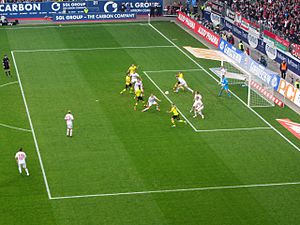
On October 15, 2011, FCA won its first-ever game in the first division. They beat Mainz 05 1–0. On April 28, 2012, FCA secured their spot in the Bundesliga for a second year. A week later, Jos Luhukay resigned as manager. On May 17, 2012, the club appointed Markus Weinzierl as their new manager.
In their second Bundesliga season, FCA struggled. They only got nine points in the first half of the season. But they managed to stay in the top league. They secured their survival in the last match of the season with a 3–1 win against Greuther Fürth.
In the 2013–14 season, FCA finished eighth in the league. They were competing for a spot in the UEFA Europa League, instead of fighting against relegation.
In the 2014–15 season, FCA qualified for the 2015–16 UEFA Europa League. They finished fifth in the 2014–15 Bundesliga, which was their best-ever finish. After a dramatic 3–1 away win in their last group match against Partizan, FCA moved to the knockout stage. They played against Liverpool in the round of 32. The first game at the WWK ARENA was a 0–0 draw. Augsburg then lost 1–0 to Liverpool at Anfield.
On June 2, 2016, Markus Weinzierl left FC Augsburg to manage Schalke 04. Dirk Schuster became the new manager. He was later replaced by Manuel Baum on December 14, 2016. In 2017–18, Baum led FCA to their best start in Bundesliga history. In 2021, American investor David Blitzer bought a 45% share in the club. Klaus Hofmann stepped down as president in September 2022. Markus Krapf took his place.
Kit
Augsburg's kits are mostly white. Red and green kits are also used sometimes.
European Record
Matches Played in Europe
| Season | Competition | Round | Opponent | Home | Away | Aggregate |
|---|---|---|---|---|---|---|
| 2015–16 | UEFA Europa League | Group L | 2–3 | 1–3 | 2nd | |
| 4–1 | 1–0 | |||||
| 1–3 | 3–1 | |||||
| R32 | 0–0 | 0–1 | 0–1 |
Players
Current Squad
|
|
Players Out on Loan
|
|
Coaching Staff
Managers
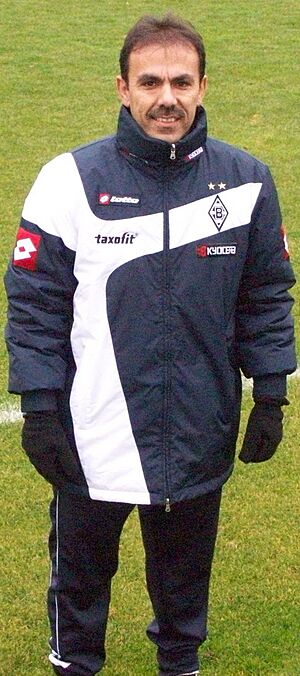
Here are some of the managers who have led FC Augsburg:
| Period | Manager |
|---|---|
| 1 July 1980 – 31 March 1981 | |
| 31 March 1981 – 31 May 1981 | |
| 1 July 1982 – 30 June 1984 | |
| 1 July 1984 – 30 June 1986 | |
| Oct 1986 – March 88 | |
| 25 February 1989 – 4 October 1989 | |
| 5 October 1989 – 6 December 1989 | |
| 22 January 1990 – 30 April 1990 | |
| 1 May 1990 – 31 May 1990 | |
| 1 June 1990 – 30 June 1995 | |
| 7 May 1995 – 30 June 1995 | |
| 1 July 1995 – 24 September 1996 | |
| 25 September 1996 – 31 December 1996 | |
| 1 January 1997 – 18 April 1998 | |
| 19 April 1998 – 30 June 1998 | |
| 1 July 1998 – 30 June 1999 | |
| 1 July 1999 – 1 December 1999 | |
| 2 December 1999 – 31 December 1999 | |
| 1 January 2000 – 30 June 2000 | |
| 1 July 2000 – 30 June 2002 | |
| 1 July 2002 – 28 September 2003 | |
| 13 October 2003 – 26 September 2004 | |
| 27 September 2004 – 25 September 2007 | |
| 1 October 2007 – 16 April 2008 | |
| 18 April 2008 – 13 April 2009 | |
| 14 April 2009 – 30 June 2012 | |
| 1 July 2012 – 2 June 2016 | |
| 2 June 2016 – 14 December 2016 | |
| 14 December 2016 – 9 April 2019 | |
| 9 April 2019 – 9 March 2020 | |
| 10 March 2020 – 26 April 2021 | |
| 26 April 2021 – 14 May 2022 | |
| 1 July 2022 – 9 October 2023 | |
| 15 October 2023 – 23 May 2025 | |
| 1 July 2025 – |
Stadium
FC Augsburg plays its home games at the WWK ARENA. This modern stadium was completed in 2009. Before that, the team played at the Rosenaustadion. The WWK ARENA is a single-tier stadium. It has a standing area behind one goal called the Ulrich-Biesinger-Tribüne. There are also three seated stands. A standing section for away fans is in the opposite corner.
FC Augsburg Seasons
Here are the club's results from the last five seasons:
| Season | League | Tier | Pos | Pld | W | D | L | GF | GA | Pts | Cup | Coach(es) | Top scorer(s) | Goals | Ref. |
| 2020–21 | BL | I | 13th | 34 | 10 | 6 | 18 | 36 | 54 | 36 | R2 | Heiko Herrlich
Markus Weinzierl |
André Hahn | 8 | |
| 2021–22 | BL | I | 14th | 34 | 10 | 8 | 16 | 39 | 56 | 38 | R2 | Markus Weinzierl | Michael Gregoritsch | 9 | |
| 2022–23 | BL | I | 15th | 34 | 9 | 7 | 18 | 42 | 63 | 34 | R2 | Enrico Maaßen | Mërgim Berisha | 9 | |
| 2023–24 | BL | I | 11th | 34 | 10 | 9 | 15 | 50 | 60 | 39 | R1 | Enrico Maaßen
Jess Thorup |
Ermedin Demirović | 15 | |
| 2024–25 | BL | I | 12th | 34 | 11 | 10 | 13 | 35 | 51 | 43 | QF | Jess Thorup | Alexis Claude-Maurice | 9 |
Honours
League Titles
Cup Competitions
|
Youth Team Achievements
|
Youth and Reserve Teams
Youth Teams
FC Augsburg's youth teams have had good success. In 1993, the Under 18 team won a national championship. They were the last non-Bundesliga club to do so. They also won four Cup titles in the early 1990s, all under coach Heiner Schuhmann. After Schuhmann left, the youth teams did not reach such high levels again.
With the creation of the Under 19 Bundesliga (2004) and Under 17 Bundesliga (2007), the club's youth teams sometimes dropped to second division status. However, they have recovered. In the 2013–14 season, the youth teams played in the top tier of youth football in Germany.
Reserve Team
The club's reserve team is called FC Augsburg II. Before the merger, as BC Augsburg Amateure, they played one season in the southern division of the Amateurliga Bayern in 1962–63.
The team later played in the Landesliga Bayern-Süd in 1976. They finished second in their first season. In 1977, they won the Schwaben Cup. This allowed them to play in the 1977–78 DFB-Pokal. They beat a second division team and another amateur team. They reached the third round but lost 0–4 to Hertha BSC.
The reserve team was disbanded for over ten years. Since 2004, the team has played in the Landesliga Bayern-Süd again. They usually had good results. At the end of the 2011–12 season, they were promoted to the Regionalliga Bayern.
See also
 In Spanish: F. C. Augsburgo para niños
In Spanish: F. C. Augsburgo para niños
 | Dorothy Vaughan |
 | Charles Henry Turner |
 | Hildrus Poindexter |
 | Henry Cecil McBay |


